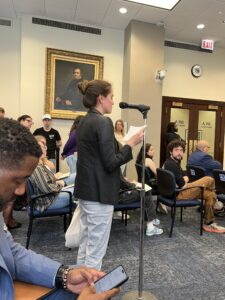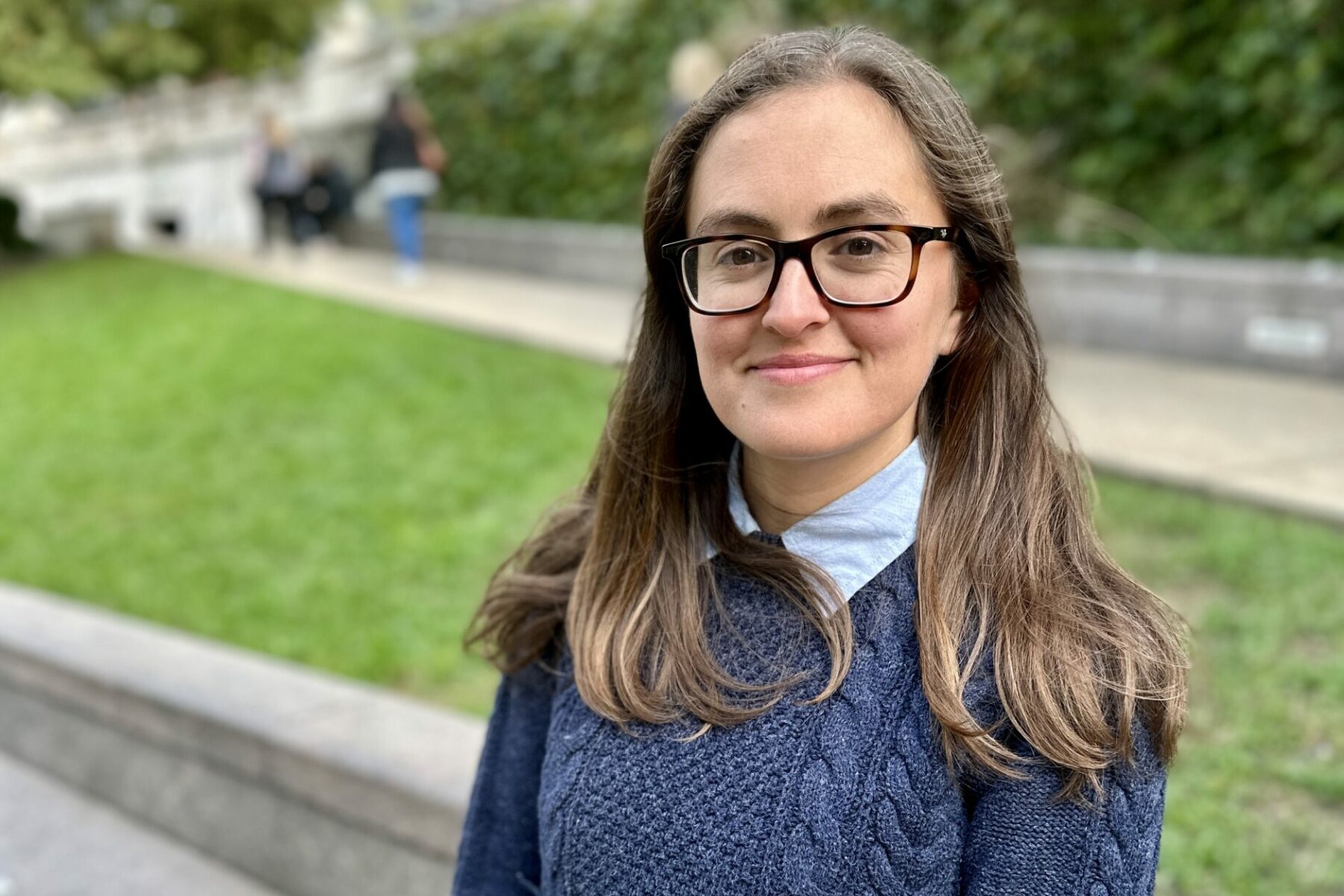Pace Bus, Mount Prospect
April 16, 2025
Addressing Chicagoland’s Transit Fiscal Cliff
For too long, public transit has been treated as a mode of last resort rather than the most efficient, sustainable, and equitable transportation option.
By Lena Guerrero Reynolds, Communications & Policy Advocate
On October 23, 2024, the Cook County Transportation Committee met to review the new budgets from Chicagoland’s transit agencies (CTA, Metra, Pace, & RTA), and on May 14, 2025 the Chicago City Council Committee on Transportation and the Public Way voted to support a resolution on transit funding and reform. Lena Guerrero Reynolds, ELPC’s Communications & Policy Advocate, testified to both about the importance of public transportation for the environment and economy of the region.

“For too long, public transit has been treated as a mode of last resort rather than the most efficient, sustainable, and equitable transportation option,” ELPC’s Lena Guerrero Reynolds said in her testimony.
Read the County testimony here
Highlights from County Testimony
Transportation is the leading source of carbon emissions in Illinois, the only sector of our economy polluting more now than decades ago. Emissions grew by 43% from 1990 & to 2017, though cars are more fuel efficient because people keep driving more distance more often cause many times it’s their only option.
On average, taking transit results in 60% less carbon pollution than driving a car by yourself, and a lot of the time, it eliminates all your footprint because you’re just one more passenger on an already traveling bus or train. The more people take transit, the more efficient it gets, unlike driving, which worsens as more people do it by creating traffic. Over a quarter of Chicago households have no car, and more should be able to save the money and still get around.
But for too long, public transit has been treated as a mode of last resort rather than the most efficient, sustainable, and equitable transportation option. Service has declined over the decades. Bus routes I used as a kid no longer exist. When my dad was a conductor in the 1970s, it took just 16 minutes to go from Montrose to downtown. It takes 25 minutes on today’s blue line, and don’t even get me started on the slow zones on the West Side blue line to Forest Park. Every time there’s a financial crisis, they cut service and lose ridership, and then wonder why we have some of the worst traffic in the nation.

“The more people take transit, the more efficient it gets – unlike driving. which gets worse as more people do it by creating traffic,” ELPC’s Lena Guerrero Reynolds said in her testimony.
Travel needs have shifted, and many jobs in the suburbs now are not served well by transit for the reverse commute. We move as a region, but our agencies are divided by city & suburbs. More people work from home, but they’re driving just as much for different trips like errands, healthcare, recreation, and care work. Traffic congestion is now worse than pre-pandemic, with vehicle miles traveled up 5% since 2019 in Chicago.
Our transit system needs the funding to adjust and meet those new travel needs. I applaud some of their latest efforts. Some long overdue fare mechanisms make it easier to pay across cta, metra, & pace, though it could be better. Thousands of students use the new unified U-pass and the super-important South Cook fare transit program. Allowing bikes & scooters on board supports last-mile travel. And Metra’s shift to regional rail is just what’s needed, but it won’t be easy.
The transit fiscal cliff next year could mean 40% service cuts, making it harder for everyone to get around. New state bills offer funding & governance reforms to improve regional coordination and restore and revamp transit for the future. But it will depend on everyone. Funding transit is a matter of economic opportunity & environmental justice. We need the county’s support for budgets today and those financial conversations ahead.
Highlights from City Testimony

Lena testifies to city council committee April 2025
This is an urgent moment. The transit fiscal cliff could mean 40% service cuts, making it harder for everyone to get around. Over a quarter of Chicago households have no car and more should be able to save the money and still get around. Transit is the circulatory system for our city and the backbone of our regional economy, so cutting transit would affect millions of people who never step foot on a bus or train. In just the first year, we could lose $2.6 billion in regional GDP and 500,000 CTA bus riders would be cut off from their local stop, adding thousands of cars to the road. To put that number in context, the Kennedy expressway only carries 250,000 cars.
Chicago has some of the best infrastructure in the country, other cities would kill for this much grade-separated rail, built-out bus networks, and transit-oriented economic vitality. We cannot squander the investments of past generations.
New state bills offer funding & governance reforms to improve regional coordination and restore and revamp transit for the future. But it will depend on everyone. Funding transit is a matter of economic opportunity, equity, & environmental justice. We need the city’s support in Springfield, so I urge you to support this resolution today.
The city council voted in the resolution in support of transit funding and reform.
Support Transit
Tell your legislators to pass transit funding & reform legislation by May 31, 2025.

